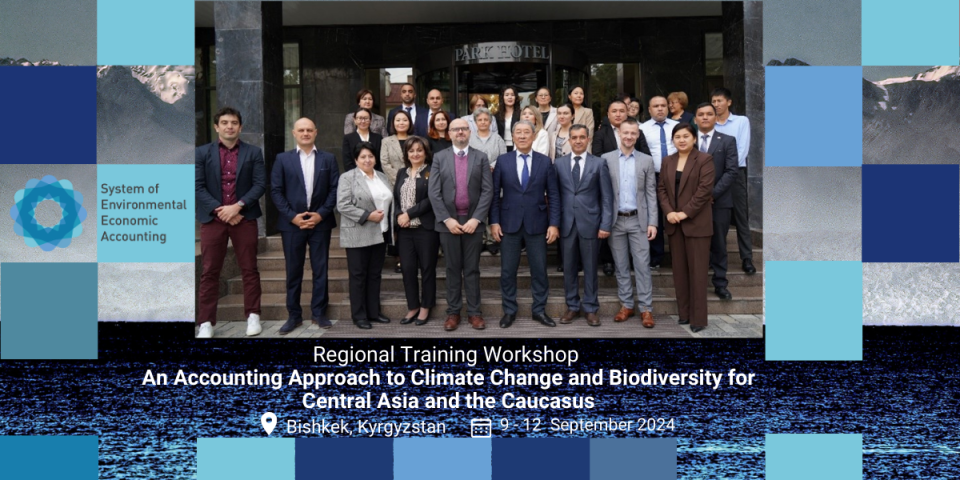Training Workshop on an Accounting Approach to Climate Change and Biodiversity in Central Asia

From September 9 to 12, 2024, the regional training "Accounting Approach to Climate Change and Biodiversity Loss in Central Asia and the Caucasus" took place in Bishkek, Kyrgyzstan. This event brought together representatives from the national statistical offices of Kyrgyzstan, Armenia, Azerbaijan, Georgia, Kazakhstan, Uzbekistan, and Mongolia with the aim to further build capacities in the region for the compilation of environmental-economic accounts relevant for climate change and biodiversity policies.
Climate change and biodiversity loss present significant challenges globally, and many countries in Central Asia and the Caucasus are particularly vulnerable due to their geographic conditions. To effectively combat these challenges, nations in the region need robust statistics and indicators that reflect the impacts of climate change and biodiversity loss. The training emphasized the importance of integrated environmental-economic statistics, which can help guide policies aimed at mitigating climate change and preserving biodiversity while fostering sustainable economic development.
National statistical offices in the region are well placed to produce statistics on the environment-economy nexus, which can be compiled according to the international statistical standard, the System of Environmental-Economic Accounting (SEEA). They have expressed strong interest to compiling various SEEA accounts, including energy and air emission accounts for informing climate change policies and ecosystem accounts to inform biodiversity policies and headline indicators under the Global Biodiversity Framework. There is a need to strengthen the capacities of national statistical offices to produce and disseminate SEEA accounts to better meet the needs of users for high quality integrated data on climate change, biodiversity and the economy.
Thirty-one participants from the region gathered to learn more about environmental-economic accounting as a tool for compiling reliable, comprehensive and integrated data to address the pressing issues of climate change and biodiversity in the region. During the four-day workshop, participants learned and discuss such important aspects as accounting for energy flows, air emissions, and other accounts closely related to climate change. Experts also discussed the implementation of ecosystem accounts and their use to combat climate change and biodiversity loss, which has a direct impact on the region's economy and sustainability. In addition to training and working on practical exercises, participants also shared their national experiences with the compilation of SEEA accounts and national policies relevant for climate change and biodiversity policies.
The workshop was organized by the United Nations Statistics Division (UNSD) and the UN Statistical Institute for Asia and the Pacific (SIAP), with the support of the Office of the Director-General for Policy Planning on Statistical Policy, the Ministry of Internal Affairs and Communications of the Government of Japan, and in collaboration with the National Statistical Committee of the Kyrgyz Republic.
More information on the workshop can be found on the workshop website.
